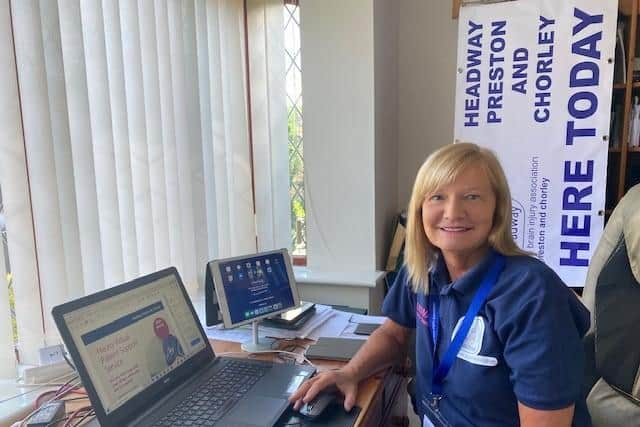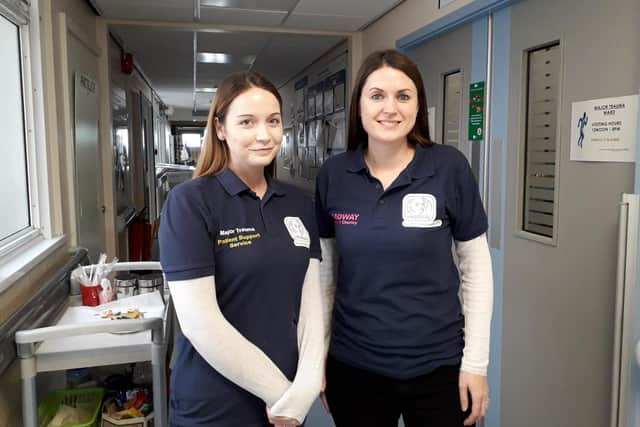Charity's appeal to help people with brain injuries in Preston and Chorley cope in lockdown
and live on Freeview channel 276
Restrictions to help stop the spread of Covid-19 have left many people without access to vital early rehabilitation that can help them to become more independent and learn how to walk and talk again, according to a survey by brain injury charity Headway UK. Staff at its Preston and Chorley branch have revealed the great lengths they are going to, to continue supporting survivors.
Some 57% of those who sustained their injuries within the past two years say their rehabilitation has been negatively impacted while two-thirds (64%) of those living with long-term effects have seen their mental health deteriorate due to coronavirus safety measures that have left them feeling isolated. Almost two thirds (62%) say they now fear for their future and half have lost access to vital support that helps them to cope.
Advertisement
Hide AdAdvertisement
Hide AdAs the charity's Preston and Chorley branch struggles to survive due to a loss of funding during the pandemic, one staff member reveals the heart-breaking isolation and anxiety faced by some vulnerable people.


Laura Brown, who runs the Keep In Touch project and whose team rings clients on a weekly basis, said: "At the beginning of lockdown, people were quite upbeat about it and wanted to stay indoors. But it's lasted such a long time that it's now affecting their mental health.
"We are supporting people who are very poorly. It's the uncertainty that's shaken a lot of them.
"Sometimes, if they live on their own and they're shielding or they're too frightened to go out, we might be the only person they've spoken to all week. It is upsetting."
Advertisement
Hide AdAdvertisement
Hide AdThe team offers reassurance, a listening ear and advice not only over the phone but also via text or Facetime or in Zoom meetings.


Laura added: "We support people with an acquired brain injury from things like a fall, road traffic accident or blow to the head from an assault. Or they might have suffered a tumour, stroke, infection or a heart attack causing a lack of oxygen to the brain.
"Everybody is impacted differently by their injuries and it's seen as an invisible illness because you can't always tell when someone has it. Some people have paralysis or weakness. Some might appear quite able but have epilepsy or a lot of pain and headaches.
"It can also affect your memory, or cause really bad fatigue or mental health problems.
Advertisement
Hide AdAdvertisement
Hide Ad"Some people struggle to completely understand what's going on around them or they can't cope in crowded areas, which could bring on their epilepsy or headaches."
Many survivors worry about burdening GPs as they fight to help stop the spread of Covid-19, adds Laura. Instead, they turn to Headway.
"We listen to their concerns or worries. Some say they don't want to bother their GP if they're not feeling well, so we signpost them to professional support or speak to specialists," she said.
"A lot of people have memory or speech problems so we know to give them time to speak."
Advertisement
Hide AdAdvertisement
Hide AdStaff also ring carers who are self-isolating and feel, as Laura puts it, "that communication with the outside world has broken down."
"It makes such a difference to both clients and carers. It's something to work towards," she added.
The Keep In Touch project is covered by the Lancashire COVID-19 Community Support Fund and the National Emergencies Trust, while the charity's Hospital Patient Virtual Service is paid for by the National Lottery.
But it desperately needs more community donations. Liz Bamber, branch manager, is clear about the potentially devastating impact that the charity's closure could have on vulnerable people across the region.
Advertisement
Hide AdAdvertisement
Hide AdShe said: “The results of this study are deeply concerning. The first two years following a brain injury are very important in terms of a patient’s long-term prognosis and any delay to receiving specialist rehabilitation and support can impact their ability to lead an independent life in the future.
"However, the charity is under financial pressure and facing an uphill battle to survive. Many of the specialist rehabilitation and support services provided by Headway Preston and Chorley are funded by donations and through events and sponsorship, which are on hold due to coronavirus restrictions."
Liz added: “If the specialist community support we provide cannot continue many vulnerable people living in our area would lose the help they rely on. Headway Preston and Chorley needs to be here long after this pandemic, so we are able continue to improve the lives of people affected by brain injury.”
To find out more about you can help the branch, including volunteering opportunities, please visit https://www.headwayprestonandchorley.org.uk/how-to-donate/#
Comment Guidelines
National World encourages reader discussion on our stories. User feedback, insights and back-and-forth exchanges add a rich layer of context to reporting. Please review our Community Guidelines before commenting.